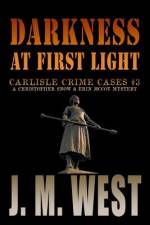av John L. Moore
177
Histories can be two-dimensional; these contain information strung along timelines. Other histories are three-dimensional, fleshing the basics out with descriptions and explanations. And then there are the four-dimensional histories, best savored slowly. 'Pioneers, Prisoners, and Peace Pipes' falls in this last category.John L. Moore's four-dimensional tales draws the reader into a world long gone in such a way that the reader gets lost in a distant place - with no desire to leave. This master story teller has discovered hidden eddies of history. He artfully weaves original source material into accounts that still touch the heart. There is the couple coming home to find their children kidnapped and their home ransacked ... There is a husband searching for a lost wife, and - years later - finding and being reunited with her. There is a 16-year old man/boy lost in a military adventure, captured by the enemy, and spilling all he knows during polite but businesslike interrogations. The settings are all over Pennsylvania; the times are the late 1700s. All true stories. And if these stories all seem weirdly contemporary; it's simply because people have always been - people.Readers will have their favorites in this collection of 11 true American historical vignettes. Among mine: 'Boy soldier nearly starves in the woods' ... This tale starts, "Michael La Chauvignerie was a 16-year-old French soldier who left his home in Canada during the summer of 1756, bound for the Ohio Country. Michael didn't know it as he left Montreal and sailed up the St. Lawrence River, but he had embarked on the first leg of a prolonged and complicated adventure that would take him to Philadelphia and, ultimately, to the Caribbean Sea." Maybe you could stop reading at this point - but I had to continue. And rest of La Chauvignerie's true story delivers!Elsewhere in "Pioneers, Prisoners, and Peace Pipes" the words of chastened but wise Ackowanothie ring true today, almost 250 years after they were uttered: "Your nation always showed an eagerness to settle our lands. Cunning as they were, they always encouraged a number of poor people to settle upon our lands. We protested against it several times, but without any redress or help. We pitied the poor people; we did not care to make use of force, and indeed some of those people were very good people, and as hospitable as we Indians ... but after all we lost our hunting ground, for where one of those people settled, like pigeons, a thousand more would settle, so that we at last offered to sell it ... and so it went on 'til we at last jumped over (the) Allegheny hills and settled on the waters of Ohio. Here we thought ourselves happy." Poor deluded Delawares!Good history, in my opinion, makes one think. And think. And think. It also makes one feel. And emotion is the secret of "Pioneers, Prisoners and Peace Pipes." Moore brings one face to face not just with facts (as important as they are), but with a larger and richer four-dimensional reality infused with feelings. He gently reminds us that humans without emotions have never existed, and that history without that dimension is not history, but simply a cheap cardboard imitation. "Pioneers, Prisoners and Peace Pipes" is four-dimensional work crafted with love. Enjoy it!Thomas J. Brucia is a bibliophile who lives in Houston, Texas. His favorite subjects include European and Asian history. Many of his reviews appear on Amazon.com
















